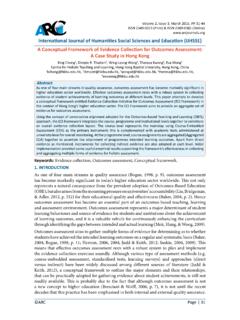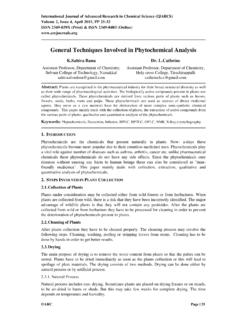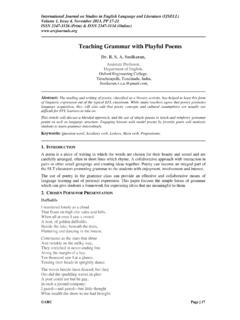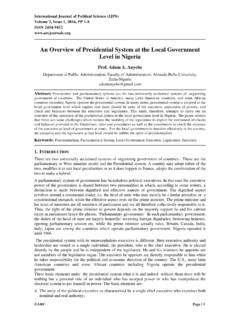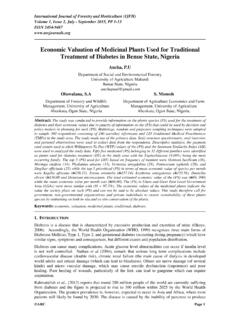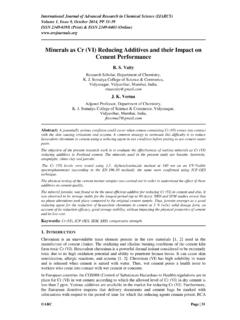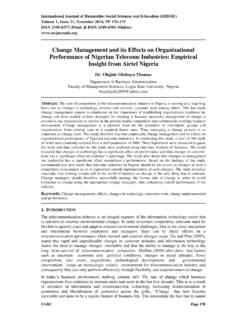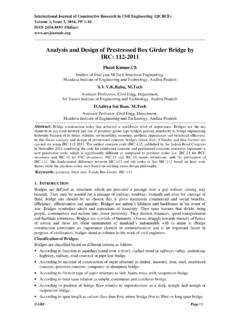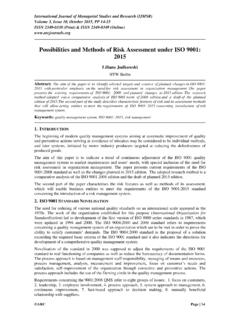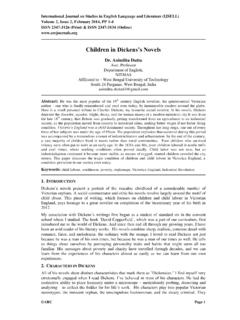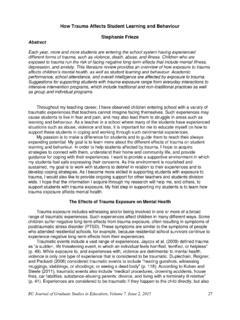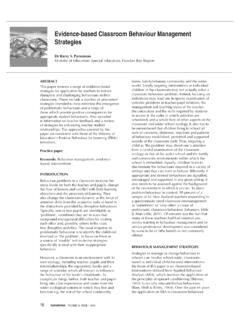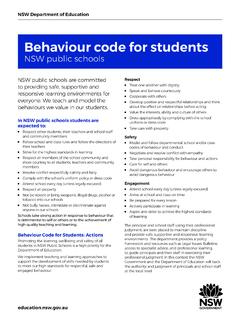Transcription of The Impact of Emotional Intelligence on Student Learning
1 International Journal of Managerial Studies and Research (IJMSR) Volume 3, Issue 9, September 2015, PP 133-136 ISSN 2349-0330 (Print) & ISSN 2349-0349 (Online) ARC Page | 133 The Impact of Emotional Intelligence on Student Learning Gift Rupande Senior Lecturer, Department of Student Affairs Zimbabwe Open University (ZOU) Abstract: Emotional Intelligence is very critical to Student Learning . Emotional Intelligence allows the individual to communicate, lead and negotiate with others. A person with Emotional Intelligence is able to understand his or her own emotions and also the emotions of others. Emotional Intelligence actually enables a person to gain more in an educational setting since the individual is able to integrate well both socially and academically.
2 A person with Emotional Intelligence is a team player, and gains a lot from positive interaction with lecturers and other students . Keywords: Emotions, Intelligence 1. INTRODUCTION Emotions are complex states of mind and body, consisting of physiological, behavioural, and cognitive reactions to situations that can be managed and directed. Events may be interpreted as sad, dangerous, or joyous, and physically, a sad situation may yield tears, or a dangerous situation may result in increased heartbeat. It is critical to realise that emotions, thought and action are intricately interwoven and linked. Emotional maturity and social skills along with Intelligence bring adjustment and success in one s life.
3 An emotionally intelligent person can manage his / her feelings in a better way and cope with stress, with the effective ability to solve problems. An emotionally intelligent person is well adjusted and more successful in various areas of educational and other professional fields. In this assignment, the writer is going to explore the Impact of Emotional Intelligence on Student Learning . 2. DIFFERENCES BETWEEN Emotional QUOTIENT AND Intelligence QUOTIENT Emotional quotient is a way to measure how a person recognizes emotions in himself or herself and others, and manages these Emotional states to work better as a group or team and on the other hand Intelligence quotient is a value that indicates a person's ability to learn, understand, and apply information and skills in a meaningful way.
4 The major difference between Emotional quotient and intelligent quotient is what part of a person's mental abilities they measure that is understanding emotions or understanding information. Both intelligent quotient and Emotional quotient are critical in ensuring ability to succeed, but due to the fact that humans are gregarious and social animals, some psychologists argue that Emotional quotient becomes more important in leading a happy and successful life. Social skills are required in every facet of an individual s life, be it in business or otherwise. According to a recent Forbes article carried out by the Carnegie Institute of Technology 85 percent of an individual s financial success is due to skills in human engineering, that is an individual s personality and ability to communicate, negotiate, and lead.
5 Surprisingly, only 15 percent is due to technical knowledge. Daniel Kahneman, found that people would rather do business with a person they like and trust rather than someone they don t, even if the likeable person is offering a lower quality product or service at a higher price." 3. Emotional Intelligence Farooq (2003) defined Emotional Intelligence as the ability to perceive and recognise emotions, to assimilate emotions, to understand the message and meaning of the emotions. Emotional Intelligence is the ability to managing and regulating emotions (Salovey and Mayer, 1990). Emotional Intelligence reflects not a single trait or ability but, rather a composite of distinct Emotional reasoning abilities like perceiving, understanding and regulating emotions.
6 Gift Rupande International Journal of Managerial Studies and Research (IJMSR) Page | 134 Farooq (2003) posited that perceiving emotions consists of recognising and interpreting the meaning of various Emotional states, as well as their relations to other sensory modalities involving comprehension of how basic emotions are blended to form complex emotions, and how emotions are affected by events surrounding experiences. Regulating emotions, as submitted by Mayer and Salovey (1997) involves control of emotions in oneself and others. According to Salovey and Mayer (1990), in sum, Emotional Intelligence is a form of Intelligence that involves the ability to monitor one s own and others feelings and emotions, to discriminate among them and to use this information to guide one s thinking and actions.
7 4. EMOTIONS Yang (2009) pointed out that emotions are a result of evaluation of internal and external pieces of information, which basically arise and change in response to a person s interaction with his or her environment. Sprirrow and Knight (2006) regarded emotions as multi-component response tendencies that unfold over a relatively short time span. Reiff et al (2001) are of the opinion that emotions are primarily motivating forces which arouse, sustain and direct activity. Emotions are reported to influence Learning , and a range of behaviours , such as helping, negotiating, altruism, risk taking and compliance. Roberts, Schulze and MacCann (2008) pointed out that our Emotional state has the potential to influence our thinking, and students learn and perform more successfully when they feel secure, happy and excited about the subject matter.
8 Oatly and Nundy (1996) argued that although emotions have the potential to energise students thinking, Emotional states also have the potential to interfere with Learning . If students are overly excited or enthusiastic, they might work carelessly or quickly rather than working methodically or carefully. Pekrun (2006) submitted that emotions such as anger, anxiety and sadness have the potential to distract students Learning efforts by interfering with their ability to attend to tasks at hand. Li (2012) pointed out that a study carried out in Spain by Valle et al in (2009) found out that students with higher self-efficacy were more likely to put more effort into their academic studies.
9 Reynolds and Walberg (1992) in a longitudinal study conducted in USA, which assessed the relationship between attitude towards mathematics and their academic performance of mathematics, found out that attitude have a powerful influence on Student s academic achievement. Ma and Kishoe (1997) also argued that attitude was a significant predictor of academic achievement. Turner, Chandler and Heffer s study (2009), assessed self-efficacy on college Student s academic achievement, and the results indicated that self-efficacy was a significant predictor of one s academic achievement. Literature actually points to the fact that self-efficacy which invariably is part of Emotional Intelligence has an Impact on retaining facts learnt, persistence in educational course and effort put to achieve a set task.
10 Pool (1997) noted that Emotional Intelligence predicts success in academic achievement, employment, marriage and physical health. Gross and John (2003) pointed out that Emotional literacy, is having the skills to understand and manage emotions, to communicate effectively in order to become an autonomous person. Goleman (1995) explained intelligent behaviour by stating that people who know and manage their feelings and deal effectively with other people s feelings are at an advantage in any domain of life as compared to those people who have no control over their Emotional life. Bar On (1997) pointed out that researches have indicated the relevance of Emotional Intelligence with respect to social and Emotional competencies, which are consider vital for a successful performance in academics.
